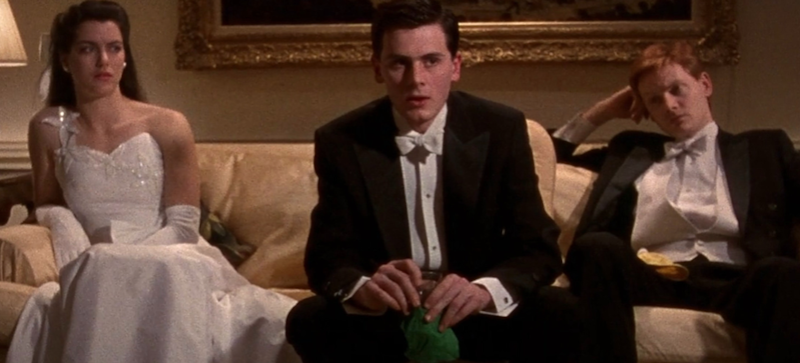It seems bizarrely out of time and place to be enthralled by a film about a bunch of New York upper-class teens—young people indulging in their own intellectualism, trying to form friendships and romances all the while talking about literature and philosophy. But as soon as I heard the opening credits music of Whit Stillman’s Metropolitan (1990), I had an inkling that my experience would be delightful.
The film takes place in a time that’s “not so long ago,” and at its center are friends that call themselves the Sally Fowler Rat Pack. They’re enjoying the holiday season in New York, especially the debutante ball. It’d be easy to conclude that, because these are affluent preppies (although they wouldn’t call themselves that), they are monochromatic. Perhaps this is true from a social and economic class point of view. But the group is composed of varied personalities and literary archetypes.
There’s Sally Fowler, who wants to be the female that’s holding the group together but her self-interest trumps that desire; Fred Neff who’s usually drunk and passed out on the chair or couch, and who begins to speak of matters that make sense only after he stops drinking; Jane Clark, dispensing wisdom like a motherly figure with unmotherly desires; Cynthia McLean, the group’s unkind promiscuous girl; Charlie Black, an intellectual with a slight stutter seeking God; Audrey Rouget, the purest of them all; and Nick Smith, the most opinionated and aggressive in the group. There are some things they take for granted: for instance, money. Their social and economic class bind them together.
Then comes an interloper, Tom Townsend. He might as well be out of an F. Scott Fitzgerald story: a not so well-off young man in a world of wealthy people. The pack welcome Tom, first as a curiosity but then as a possibility of romance and friendship. Much like most of the pack, Tom too pretends that he knows what life’s about. He’s onto the hypocrisy of the society, and although he’s not declaring anyone a phony, he does look down upon people from his perch of pseudo-intellectualism.
Perhaps all people, good or bad, have an innate feeling of self-interest. Yet Audrey is different and isn’t only a charming and beautiful young woman, but as Charlie Black keeps repeating, principled. She’s by no means a prude, yet she’s not promiscuous. She’s authentic and perhaps like Prospero’s daughter, Miranda, full of wonder without yet knowing that part of life in which we’re all “doomed.”
She’s enthralled by Jane Austen and is happy to have a conversation with Tom about Austen’s novel, Mansfield Park, or in this case, Lionel Trilling’s critique of the novel. Tom’s offering his most confident opinion about the novel’s heroine only to admit to Audrey that he hasn’t actually read the novel but relies on Trilling’s critique. Apparently, reading novels is a waste of time. Best to find a critic you can trust and go by his interpretation. But this doesn’t preclude you from having an opinion on something you haven’t read.
As the holiday season moves along, so do the group’s desires. Tom might be one of the catalysts for the group’s breakup, but it was all falling apart thanks to the passionate personalities in the mix. However, there are rules in this society that must be followed. When Tom abruptly abandons Audrey at the ball for the ever elusive Serena Slocum, Audrey’s devastated. What’s the big deal, you might say? Why should we care about their or each other’s emotions? Aren’t feelings just passing anyway?
But it is a “big deal.” Audrey operates in a sphere that may look naïve at first glance. Why would anyone take Jane Austen’s world seriously? But Audrey is not merely sentimental. She’s looking for a meaningful connection with a young man—in this case, Tom. She doesn’t want to just take but also give. Audrey’s heart is pure, not in some ethereal sense but in a sense of authenticity. It’s her who may not fit into the pack, and not necessarily Tom.
It’d be a mistake to view Metropolitan only through the lens of class structure. Certainly, Stillman creates composites (“Like in the New York magazine!”) that represent certain social status. Or one could conclude that these privileged (such a heavy word these days) kids need to shut up and do some manual labor and feel guilty for all that upper-class debauchery and intellectualism. But that too would be missing the delight and beauty of this film.
We’re touched by Audrey’s beautiful mind and heart as well as Tom’s final effort to “save” her from the clutches of that rogue, Rick Von Sloneker (a harsh name that might prompt you to suddenly speak German). We’re surprised by Nick’s gentleness in the midst of his continuous bravado, and Charlie’s shedding of irritating “double English-Philosophy major” attitude.
The end, both satisfying and ambiguous, freezes three friends in time immemorial: Tom, Audrey, and Charlie walk along the road, trying to get a ride from Southampton to Manhattan. The softness of the scene brings to mind scenes from François Truffaut’s Jules et Jim (1962). Shedding metaphysical masks and growing up, Metropolitan is ultimately a film about love—the most fundamental human desire and reality.

